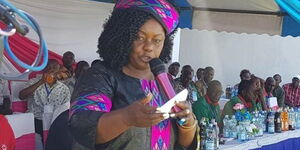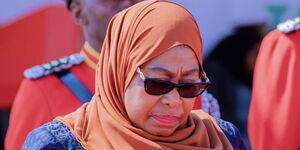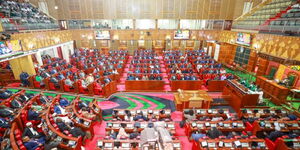Just moments after the new Independent Electoral and Boundaries Commission (IEBC) was sworn into office, netizens intensified calls online for the recall of Members of Parliament deemed unsatisfactory by their constituents.
Reviving a discourse that began during the June 2024 protests, when attention was drawn to poorly performing lawmakers, Kenyans emphasised the need to take advantage of the reconstitution of the IEBC to initiate the recall process.
In addition to underperforming MPs, Kenyans also flagged lawmakers sponsoring Bills seen as detrimental to the common mwananchi, those suppressing human rights, and others allegedly acting at the behest of senior government officials, as candidates for removal from office.
At the height of the recall debate, Kikuyu MP and Majority Leader in the National Assembly Kimani Ichung’wah, Nairobi Woman Representative Esther Passaris, South Mugirango MP Sylvanus Osoro, Molo MP Kuria Kimani, Belgut MP Nelson Koech, and Dagoretti North MP Beatrice Elachi were among those named for potential recall.
On Friday, July 11, Erastus Ethekon was sworn in as the new Chairperson of the IEBC, replacing Wafula Chebukati, who had served at the helm of the Commission until the expiry of his term in 2023.
Ethekon took the oath of office alongside six commissioners at a ceremony held at the Supreme Court building and presided over by Chief Justice Martha Koome.
During the event, Ann Njeri Nderitu, Moses Alutalala Mukhwana, Mary Karen Sorobit, Hassan Noor Hassan, Francis Odhiambo Aduol and Fahima Araphat Abdallah were all sworn in as Commissioners. Fahima was later chosen to be the Vice Chair of the Commission.
The IEBC plays a critical role in the process of the recall of an MP or Member of County Assembly (MCA) in regards to receipt of the petition, verification, and subsequently conducting by-elections in the constituency or ward in which the petition was filed.
To recall an MP or MCA, the first step is to file a petition with the IEBC. The petition must be in writing and signed by a petitioner who is a registered voter in the constituency or county in which the recall is sought.
Critically, a recall can only be initiated two years after the election and not later than one year before the next General Election. Also, a recall petition cannot be filed against an MP or MCA more than once.
The second step involves collecting the names and signatures of at least one-third of the registered voters from the constituency. Those signing in support of the recall must be registered in different parts of the constituency, not just from one ward or locality.
The petition must also specify the grounds for the recall and be accompanied by the fee prescribed for an election petition (Ksh30,000 for an MP, Ksh15,000 for an MCA).
Grounds for recall include breaches of integrity under Chapter Six of the Constitution, misuse of constituency funds, or conviction for electoral offences.
The third step is carried out by the IEBC, which must verify the list of names within 30 days. Within 15 days after verification, the IEBC shall issue a notice of the recall to the Speaker of the relevant House.
Within 90 days of publishing the notice to the Speaker, the IEBC must conduct a recall election (i.e., "Do you wish to recall your MP/MCA?"). This is the penultimate step before the conduct of a by-election. The recall election is decided by a simple majority of the voters who participate in the poll.
Where a recall election results in the removal of a member of Parliament, the Commission shall conduct a by-election in the affected constituency or county. Notably, an MP who has been recalled may run in the by-election.












